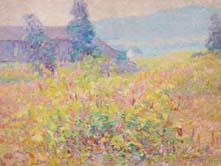Artist Profile
Henry Ryan MacGinnis
- Lived:
- 1875-1962
- Worked:
- Indiana, New Hampshire, Delaware Valley
- Style:
- Landscape, Portrait
HENRY RYAN MACGINNIS, was born in Indiana and began his art studies under the eminent Hoosier artists T.C. Steele, J.O. Adams and William Forsyth. One of his earliest exhibitions was in 1896, when he showed his work with other notable Hoosier artists such as T.C. Steele, J. Ottis Adams, R.B. Gruelle, William Forsyth, Otto Stark and Clarence Ball.
In 1900, MacGinnis left Indiana to study in Europe. For five years, he painted and studied in Paris and Munich, where he won Honorable Mention from the Royal Academy of Fine Arts in Munich. He was a member of the Audubon Artists, Hoosier Salon, Salmagundi Club, and Allied Artists.
In 1908, soon after MacGinnis returned to the states, William Merritt Chase, chairman of the Exhibition Committee of the 19th Annual Exhibition of the Art Club in Philadelphia, selected the MacGinnis painting New Hampshire Hills for an important exhibit. The show included paintings from other artists such as Mary Cassatt, Ernest Lawson, Childe Hassam and William Merritt Chase.
A broad look at MacGinnis' work suggests a concern with impressionism;however, for the most part, MacGinnis stayed within the realm of realism often softened by an impressionistic approach. As mentioned, MacGinnis began painting with the Hoosier artists in Indiana, primarily focusing on
landscapes from that region.In 1924, MacGinnis moved to Trenton, New Jersey where he both taught and continued to paint. He focused on painting portraits and landscapes near the Delaware River and New Hope, Pennsylvania region. During this period, he also painted many landscapes and seascapes in Provincetown, Massachusetts, Cape Breton, New Jersey, and in Vermont and New
Hampshire.Henry Ryan MacGinnis paintings were recently on show at the Broome Street Gallery, Soho, New York City. The show exclusively featured over thirty of his paintings dating from 1900 to 1940. The paintings were primarily images of the Delaware River Valley and of landscapes of Northern New England.
Source:
Richard Frey


